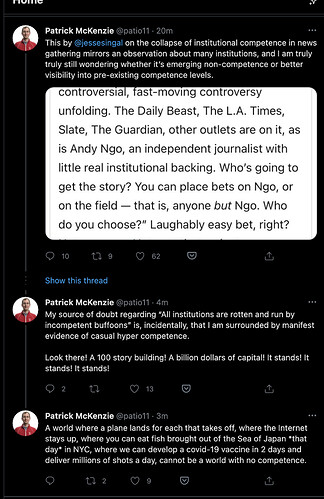One thing I think that the KonMari method helps people achieve is some sort of final judgment or certainy regarding getting rid of particular items. I think that’s part of the benefit that people experience from considering each item individually and its role in their life and that sort of thing.
Tesla is getting high level attention from the government for making misleading claims
Re organizing … I have too many computer cables. Like USB cables and stuff. Having multiple cables of stuff you go through frequently (eg for me it’s lightning cables) can make sense. But you probably don’t need a drawer full of obscure cables. Like maybe one copy of each type of cable that isn’t in the high use category is sufficient
One thing is it makes it harder to find the cable you actually need if you’re drowning in cables
new Trump ad
I have a PhD in political science with a focus on international relations. Most people in my position would tell you that you should give my opinions on my topic of expertise more weight because of my credentials. I believe if anything, you should hold my degree against me, as getting a PhD is probably the most inefficient way to understand a topic, and a person seeking that credential has shown that they don’t understand that. I think I’ve been right on Afghanistan and other American interventions because of good intellectual habits, including a genuine concern with what is true. But that has little to do with any training I got from political science.
i particularly like this comedy bit from Louis CK.
It’s comedy but there’s a real point (which is why I think I like it): the world is filled with wonders that people take for granted.
apple is supposedly working on nifty emergency satellite features
The first feature, Emergency Message via Satellite, is designed to let users text emergency services and contacts using a satellite network when there is no signal available, and it will be integrated into the Messages app as a third communications protocol alongside SMS and iMessage. It will feature gray message bubbles rather than green or blue, and message length will be restricted.
The texting-via-satellite tool, codenamed Stewie inside Apple, will restrict messages to a shorter length. The texts will automatically push through to an emergency contact’s phone, even if the do-not-disturb setting is on. One planned design will let a user send the message by typing “Emergency SOS” where they would usually input a contact name. In addition to delivering texts, the service may eventually be able to handle some phone calls too.
The second feature will let users report major emergencies like plane crashes and fires using satellite networks. It will be similar to a “911” call in the U.S. and can provide information like a user’s location and medical ID, in addition to alerting emergency contacts.
this Chrome extension defeats paywalls on many sites
I like this! I’ve seen it before but it’s funny to see again as well. One point I thought of is that maybe it’s good that people take all of this wondrous stuff for granted as the new norm. That’s kind of the point of progress and development. We establish new baseline levels of comfort, like automated weather indoors, automated cleaning from roombas, automated delivery from Amazon etc. and we start complaining if those systems break and we seek ways they could be better. Granted, I think there is a lot of unproductive entitlement that Louis is referring to there, but I think generally it’s the complaints and the entitlement that push companies forward to solve those problems and create new and better norms for people.
Personally I think it’s wondrous that we can take flying in the sky for granted and not even bat an eye at it (barely like 200 years or something after we discovered it in the first place), instead complaining about the quality of the food on them. To me that situation being possible is a marvel of mankind’s progress and something of which we can be proud.
I disagree. I don’t think you have to think about what things would be like without some bit of technological progress all the time, but I think you should sometimes. For one, it can give you a greater appreciation for the thing and make the world seem nicer. It can also help make you more resilient. Also, these things that people take for granted have requirements (like capitalism, private property, an open and critical culture capable of discovery things) that people often oppose/attack, so maybe if they thought about things and their requirements instead of just taking for granted that they exist “somehow”, that’d lead to people improving their ideas.
Sounds like a stoicism thing. I think Sam Harris at some point talked about a method he got from stoicism where you imagine a bunch of bad things happening in the near future and your life falling apart, and then come back to the present and feel really grateful that those things haven’t happened and that your life is actually pretty good.
I agree that appreciation/gratitude is useful to cultivate consciously by thinking about how things are better today than they were before. I agree that it helps with resilience too because if you appreciate the extra things, if they go down for a bit you don’t get too mad because you were treating them as bonuses anyway rather than things you’re entitled to unconditionally (e.g. if the power goes out, you might be ok reading a book by candlelight knowing that it was nice to have a computer and stuff but that you can live without it for a few hours and be just fine).
I agree re: thinking about where stuff comes from. I never thought about that consciously so I took for granted that it was just there. I think many people in my generation make the same mistake, which is that they’ll rally to “eat billionaires” without considering that maybe the system that enabled billionaires is what makes life so good today. Seems ironic to me that people use Amazon so much personally but will denigrate the company as evil (I think there are valid criticisms of how workers are treated or the way things are run, but it’s like people argue that we should just take Amazon and make it government run or something, when to me it’s clear that Amazon would suck if the government tried to run it. So many of its improvements on traditional logistics and systems happened because it took risks to change things and disrupt other industries)
So now that I’ve agreed with everything you’ve said, I’m not sure what I really disagree with. I guess the perspective I was coming from was of like… it’s great that kids today get to reap the benefits of innovation from the past and maybe it’s a good thing that they can take it for granted. But I think the mistake I was making is treating people like… idk the best term, but like unthinking sheep rather than individual, creative thinkers who should be striving to improve themselves rationally and understand the world around them. So just enjoying something or its benefits without thinking about how it came about, why it continues, and how to continue making things better is a pretty terrible way to live in the long run.
So I concede what I said and I think I was wrong. I don’t think I thought it through very deeply. The world would be a better place if people thought about why things are the way they are and if they didn’t take it for granted. It’s OK for people to enjoy the improvements we have and for their standards of tech and service to get higher as we improve, but those things have to follow reason rather than being arbitrary or just based on culture.
Yep ![]()
Terrible tweet imho (didn’t watch vid)
If you don’t want to give people welfare benefits, then don’t do that. But blaming rich people for paying employees an amount that the employees find worth it to work at given the welfare programs that exist is dumb. Like I guess you just have to pay everyone enough so that they don’t qualify for various govt programs? And which programs btw? Tons of people qualify for all sorts of stuff nowadays, even if they’re more middle class.
Below is some material from Atomic Habits by James Clear, which caused me to think of this curi post when I read it:
IN THE 1940S, a Dutch scientist named Niko Tinbergen performed a series of experiments that transformed our understanding of what motivates us. Tinbergen—who eventually won a Nobel Prize for his work—was investigating herring gulls, the gray and white birds often seen flying along the seashores of North America.
Adult herring gulls have a small red dot on their beak, and Tinbergen noticed that newly hatched chicks would peck this spot whenever they wanted food. To begin one experiment, he created a collection of fake cardboard beaks, just a head without a body. When the parents had flown away, he went over to the nest and offered these dummy beaks to the chicks. The beaks were obvious fakes, and he assumed the baby birds would reject them altogether.
However, when the tiny gulls saw the red spot on the cardboard beak, they pecked away just as if it were attached to their own mother. They had a clear preference for those red spots—as if they had been genetically programmed at birth. Soon Tinbergen discovered that the bigger the red spot, the faster the chicks pecked. Eventually, he created a beak with three large red dots on it. When he placed it over the nest, the baby birds went crazy with delight. They pecked at the little red patches as if it was the greatest beak they had ever seen.
Tinbergen and his colleagues discovered similar behavior in other animals. For example, the greylag goose is a ground-nesting bird. Occasionally, as the mother moves around on the nest, one of the eggs will roll out and settle on the grass nearby. Whenever this happens, the goose will waddle over to the egg and use its beak and neck to pull it back into the nest.
Tinbergen discovered that the goose will pull any nearby round object, such as a billiard ball or a lightbulb, back into the nest. The bigger the object, the greater their response. One goose even made a tremendous effort to roll a volleyball back and sit on top. Like the baby gulls automatically pecking at red dots, the greylag goose was following an instinctive rule: When I see a round object nearby, I must roll it back into the nest. The bigger the round object, the harder I should try to get it.It’s like the brain of each animal is preloaded with certain rules for behavior, and when it comes across an exaggerated version of that rule, it lights up like a Christmas tree. Scientists refer to these exaggerated cues as supernormal stimuli. A supernormal stimulus is a heightened version of reality—like a beak with three red dots or an egg the size of a volleyball—and it elicits a stronger response than usual.
Apple will supposedly be coming out with an updated high end mac mini soon
I could see an argument for getting it versus, say, an iMac. There is some virtue in having the display part separate from the computer part. Like, if the Mac Mini needs a repair, it’s no big deal to take it to a store or send it in, but a big iMac is kind of a pain in the ass to deal with. And if you have a problem with the display on an iMac, you need to like, send in your whole computer to get it repaired. I wonder how powerful the upcoming Mac Minis will be relative to upcoming M1 big iMacs, though. Intuitively, I would expect the big iMacs to have higher performance options available, but who knows what Apple will actually do.
I liked this Teddy Roosevelt quote, especially the part about “disinterested and kindly good sense” re: the rights of other people. There’s an idea there of trying to be unbiased and not partisan.
Many qualities are needed by a people which would preserve the power of self- government in fact as well as in name. Among these qualities are forethought, shrewdness, self-restraint, the courage which refuses to abandon one’s own rights, and the disinterested and kindly good sense which enables one to do justice to the rights of others.
The Matrix Resurrections | In Theaters and on HBO Max December 22 | HBO Max.
won’t have to break my no theater streak!


